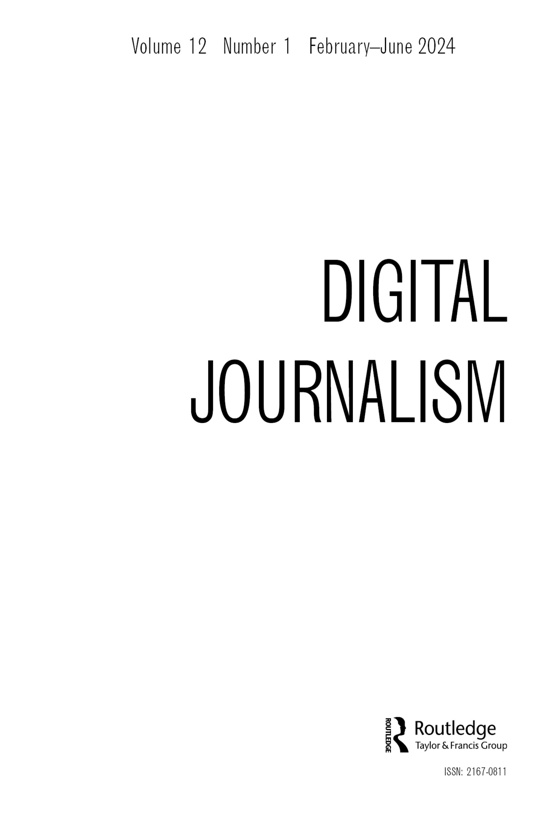Submit a Manuscript to the Journal
Digital Journalism
For a Special Issue on
Unfolding Disentanglements from Platform Power in Journalism
Abstract deadline
05 April 2024
Manuscript deadline
19 August 2024

Special Issue Editor(s)
Sarah Anne Ganter,
Simon Fraser University, Canada
[email protected]
Karoline Andrea Ihlebæck,
Oslo Metropolitan University, Norway
[email protected]
Annika Sehl,
Catholic University of Eichstätt-Ingolstadt, Germany
[email protected]
Unfolding Disentanglements from Platform Power in Journalism
This special issue compiles new perspectives on disentanglements from platform power in journalism. The special issue focuses on strategic forms of resistance, perceptions, practices, and alliances that enable or result in disentanglements of asymmetric power and dependencies from platforms in journalism. Here, we refer to a broad take on digital platforms, including social media, search engines, content aggregators and AI-generating platforms such as ChatGPT.
In the last decade, researchers have investigated the rise of platform power within the field of journalism (e.g., Hermida, 2010; Beláir-Gagnon, 2015; Helberger, 2020; Nielsen & Ganter, 2018, 2022). The dissection of platform power in this context has since evolved around the conceptualization and empirical studies on platform asymmetries (Ihlebæk & Sundet, 2021; Nielsen & Ganter, 2018; 2022; Poell et al., 2022), platform capture (Usher, 2021) and platform dependencies (Meese & Hurcombe, 2021; Pyo, 2022). Much of this work has benefited from the interdisciplinary field of platform studies and its insights into practices, economics, infrastructures and functionalities of digital platforms (e.g. Plantin et al., 2016; Van Dijck et al., 2018). Concepts such as “platform publishing” and “platformed publishing” (Nielsen & Ganter, 2022, p. 87) point to often unintended consequences of platform power and the varying extent to which media organizations depend on platforms for their content to be discovered and distributed and social media strategies they develop in this respect (Sehl et al., 2021). However, to fully understand these tendencies, attempts to disentangle – or to remain independent from platform power need to be conceptually included and studied.
Therefore, further empirical and conceptual work is urgently needed to understand better and theorize disentanglement, its impact over time, its dimensions, and the consequences of the varied responses across contexts. Some scholarly works have examined attempts to discipline, control or regulate platforms (Bossio et al., 2022; Ganter, 2022). Less studied is what Chua & Westlund (2019, 2022) have identified as "platform counterbalancing," a technique they observed news organizations in Singapore used to confront existing asymmetries with the platforms. They describe platform counterbalancing as reducing dependence on platforms non-proprietary to them (Chua & Westlund, 2022).
We need to build on the scarce existing work to study further emerging counter-power initiatives in journalism, successful or unsuccessful disentanglements from platform power, strategies, innovations and alliances, practices and consequences. With this special issue, we want to create a space for analyzing the probabilities, processes, strategies, challenges and affordances that come with working towards reducing dependence on platforms. As such, we consider the following topics:
- Organizational case studies on both editorial and business-related journalistic projects that aim to disentangle from platform power
- Successful or unsuccessful government, citizen and or industry-led initiatives that enable or restrain counter-power initiatives to platform power in journalism
- Studies that contribute to understanding shifts in power dynamics between digital platforms and journalism by explaining emerging disentanglements from the perspectives of media organizations, journalists and policy-makers
- Studies focusing on journalists‘ practices, engagements with alternative tools, artifacts and new arrangements that potentially foster disentanglements from digital platforms
- Analysis and reflections of journalistic projects that have never been entangled with digital platforms in the first place and continue to maintain their independence
- Comparisons of different approaches to delimit platform power in the media sector on organizational- and policy levels
- Comparative approaches of strategies, perceptions, practices and alliances across different media types and national contexts (e.g. PSM vs. Private Sector Media)
- Studies on press subsidies (built outside of platforms’ contributions) that focus on their impacts on enabling disentanglements of platformed journalism
- Studies refining the understanding of independence from platform power versus previous forms of independent journalism (independence from state or economic power)
- Technological developments, innovations and emerging infrastructures that create a potential for independencies from digital platforms and delimit platform power in journalism
- Other players, such as new emerging or alternative platforms or independent third parties and their services that provide tools in the competition to digital platforms and new, alternative services used by journalists and media organizations
- Theoretical reflections and contributions which conceptually enrich the ideas of disentangling platform power, counterbalancing and establishing counter-power in journalism
- Perspectives drawing from platform studies and focusing on affordances and constraints of disentanglements from platform power in journalism
- Consequences of disentanglements from platform power for journalism over time (e.g. consequences for relations between journalism, news organizations and audiences)
We particularly encourage submissions that study underrepresented and understudied contexts and by scholars from/based in non-western contexts.
Looking to Publish your Research?
Find out how to publish your research open access with Taylor & Francis Group.
Choose open accessSubmission Instructions
Information about submitting
Proposals should include an abstract of 500-750 words (not including references) and a title page with background information on the author(s), including an abbreviated bio that describes previous and current research related to the special issue theme. Please submit your abstract as one file (PDF) with your name(s) clearly stated in the file name and on the title page. Use the special issue title as a header in the email. Send your proposal to Dr. Sarah Anne Ganter at [email protected] by February 5, 2023, as stated in the timeline above. Authors of accepted proposals are expected to develop and submit their original article for double-blind peer review, following the journal's peer-review procedure, by the deadline stated. Articles should be between 7,000 and 9,000 words (including references) and follow Digital Journalism’s style guidelines.
Abstract submission deadline: March 25, 2024
Notification on submitted abstract: April 7, 2024
Article submission deadline: August 19, 2024